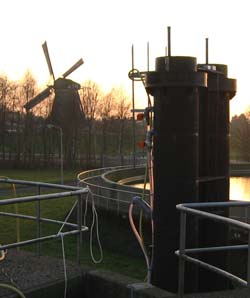Delft water-purification method promises radical improvement

A test reactor for the new aerobic granular sludge technology (Nereda TM).
With the new aerobic granular sludge technology (Nereda TM), aerobic (thus oxygen using) bacterial granules are formed in the water that is to be purified. The great advantage of these granules is that they sink quickly and that all the required biological purifying processes occur within these granules.
The technology therefore offers important advantages when compared to conventional water purification processes. For example, all the processes can occur in one reactor. Moreover, there is no need to use large re-sinking tanks, such as those used for conventional purification. Such large tanks are needed for this because the bacteria clusters that are formed take much longer to sink than the aerobic granule sludge.
According to Delft PhD researcher Merle de Kreuk, a Nereda TM purification installation needs only a quarter of the space required by conventional installations. Moreover, Nereda TM uses 30% less energy than the normal purification process. This Nereda TM purification process is suitable for both domestic and industrial waste water.
Delft University of Technology has a long tradition in researching the possibilities of water purification with aerobic granular sludge. The maturation of the technology is largely due to the research conducted by De Kreuk. During her PhD research with Prof. Mark van Loosdrecht, De Kreuk – working together with DHV engineering bureau and supported by STOWA and STW grants – solved various technological bottlenecks and expanded the capacity of the test installation from 3 litres per hour to 1,500 litres per hour. DHV now has the final design, which is ready for practical implementation.
The aerobic granular sludge technology is very promising, and has been nominated for the Dutch Process Innovation Award 2006. The technology is now in the commercialisation phase. In the coming years, De Kreuk will continue to contribute to the project's trajectory as a Delft researcher. DHV is currently negotiating with water purification companies to test this purification method on a larger scale. The first installations are already in use in the industrial sector.
Media Contact
More Information:
http://www.tudelft.nlAll latest news from the category: Process Engineering
This special field revolves around processes for modifying material properties (milling, cooling), composition (filtration, distillation) and type (oxidation, hydration).
Valuable information is available on a broad range of technologies including material separation, laser processes, measuring techniques and robot engineering in addition to testing methods and coating and materials analysis processes.
Newest articles

Security vulnerability in browser interface
… allows computer access via graphics card. Researchers at Graz University of Technology were successful with three different side-channel attacks on graphics cards via the WebGPU browser interface. The attacks…

A closer look at mechanochemistry
Ferdi Schüth and his team at the Max Planck Institut für Kohlenforschung in Mülheim/Germany have been studying the phenomena of mechanochemistry for several years. But what actually happens at the…

Severe Vulnerabilities Discovered in Software to Protect Internet Routing
A research team from the National Research Center for Applied Cybersecurity ATHENE led by Prof. Dr. Haya Schulmann has uncovered 18 vulnerabilities in crucial software components of Resource Public Key…





















